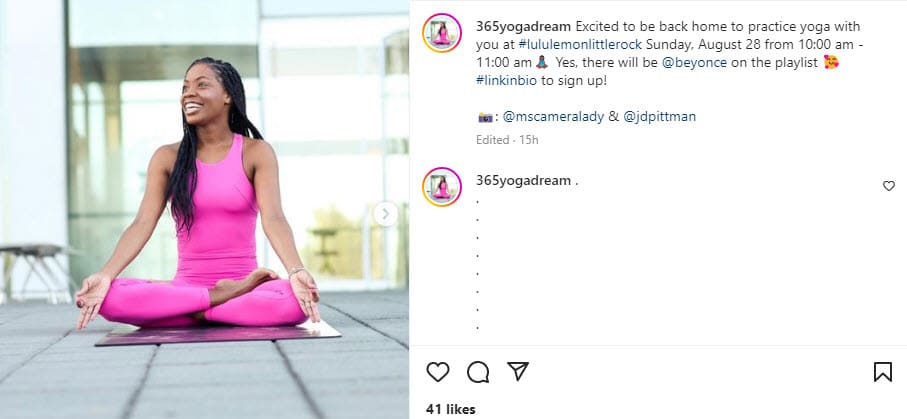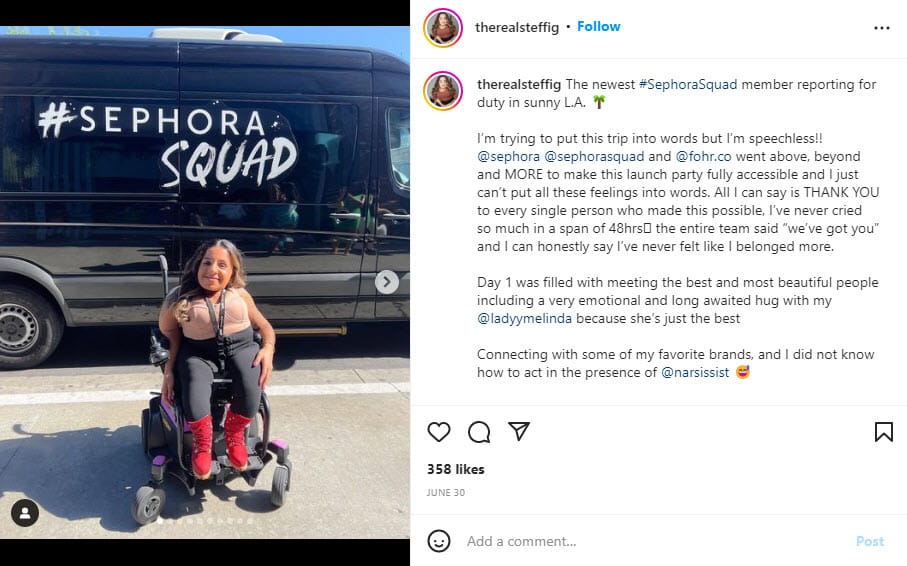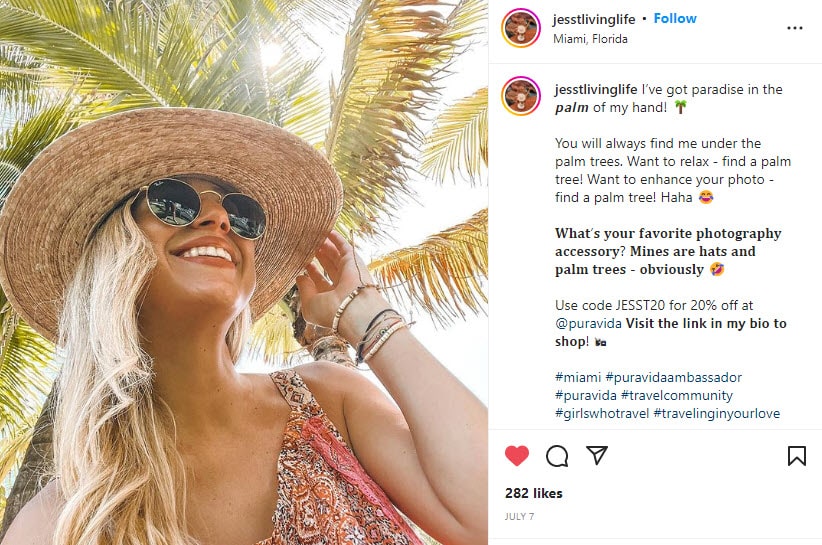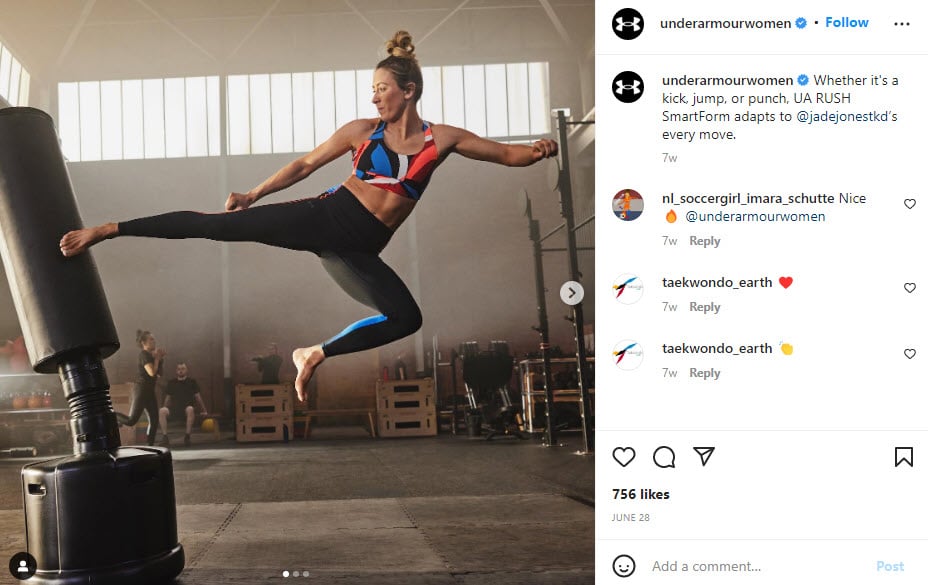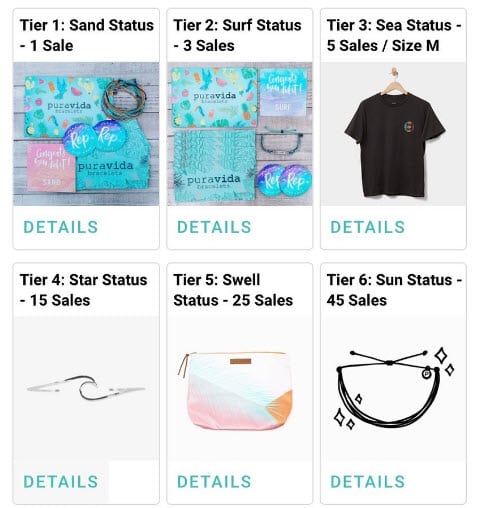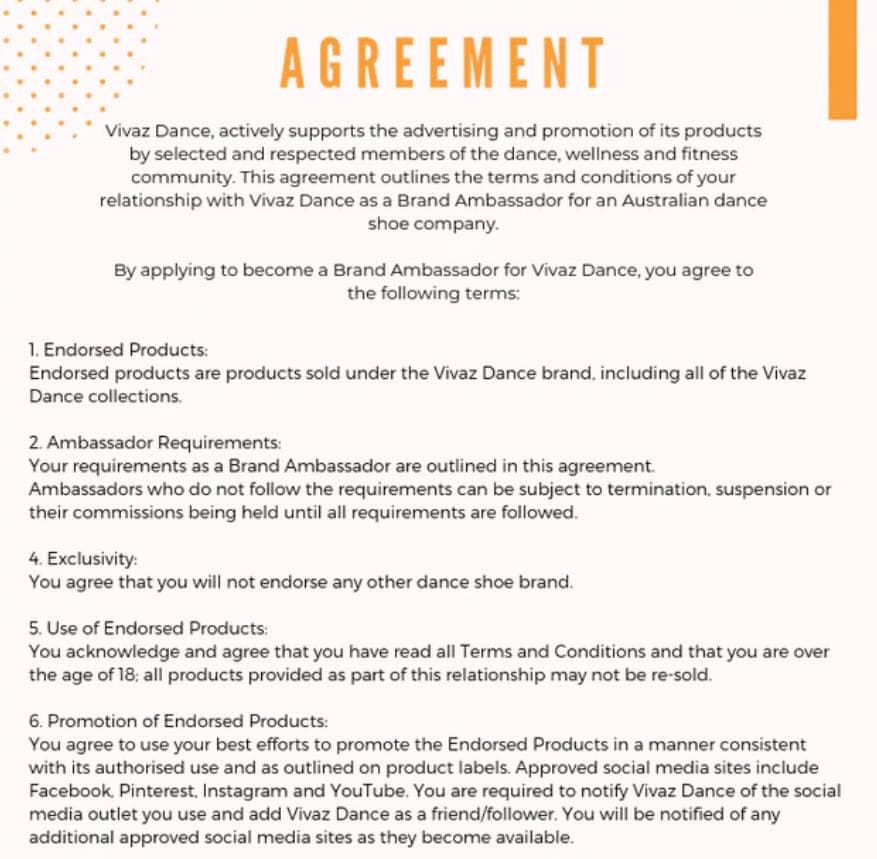Storytelling has always been an effective way to create meaningful connections. This burning desire to share stories with others is what makes social media one of the most powerful marketing platforms. It’s no wonder that brands are increasingly marketing their products on platforms such as TikTok, Instagram, and LinkedIn.
While running a social media campaign for your brand can be an effective marketing strategy, partnering with social media brand ambassadors is even better. These individuals are loyal to your brand, and they further increase a brand’s exposure among new, relevant audiences. As social media brand ambassadors tell their own authentic stories, they share the story of your brand at the same time.
This post will cover what a social media ambassador program is and how to use it in your digital marketing strategy.
Let’s get started.
What is a social media brand ambassador?
A social media brand ambassador is a long-term representative of your brand, who primarily promotes you on social media platforms.
A brand ambassador is someone who loves your brand and who agrees to continually promote it. They become the face of your brand, and help build trust in your brand among their audience.
A social media brand ambassador has authority in your niche or among an audience that matches your target audience. Within their social posts, they genuinely and repeatedly share how they use your product in real life. They also tell and show their audience the benefits of using your products. Social media ambassadors don’t need to have a large social media following, provided their following trusts them highly and engages with them frequently.
One example of a brand that makes good use of social media brand ambassadors is Lululemon. They have a group of social media ambassadors who pitch their athletic clothing on Instagram and other social media channels, often while engaging in athletic activities or teaching fitness classes.
Pro tip: Before recruiting a social media brand ambassador, you should ensure that they have:
- An authentic love for your brand
- High audience engagement
- Strong communication skills
These are the most important skills for brand ambassadors to have.
Social media brand ambassadors vs. influencers
Social media brand ambassadors and influencers are both parties that companies recruit to promote their brand on social media. But there are a few key differences between the two.
While social media influencers only promote your brand for a short duration (via a one-off post or a single short campaign), brand ambassadors promote you repeatedly and establish a long-term relationship with you (usually for at least one year).
And while influencers may not have used your product before their marketing campaign, all social media brand ambassadors have already used and loved your product before they started to officially represent your brand on social media.
Another difference between these partnerships is that influencers’ posts often read like ads – they focus on selling the product to their followers. Conversely, ambassadors are more focused on authentically promoting your brand, based on how they’ve actually used your product and the value they’ve received from it.
Lastly, influencers promote a wide range of brands on social media. At times, they end up promoting two competing brands. On the other hand, brand ambassadors focus on promoting a single brand in the long term. And if they represent multiple brands, they definitely won’t promote competing brands simultaneously.
Why you should leverage social media brand ambassadors
Now that we know what a social media brand ambassador is, let’s look at why you should use them in your social media marketing.
They help expand your reach to new, relevant audiences
Social media brand ambassadors are well-positioned to reach new, relevant audiences and tap into new markets. Even if they don’t have a large social media following, brand ambassadors greatly expand your market share, since they have authority with an audience that’s also your brand’s target market.
Their word-of-mouth can spread quickly across social media
Since brand ambassadors already have a strong online reach – and may have professional relationships within the industry – seeking their help to create brand awareness can be highly beneficial. This is true even if their follower count is relatively small.
For example, suppose you have 10 social media brand ambassadors with 2,000 followers on Instagram apiece. With their help, you can easily and effectively reach 20,000 followers through their promotions.
Their followers trust what they say about your brand
Potential customers highly trust recommendations that come with personal experiences, far more than they trust ads and messages from your brand. Since brand ambassadors have used a product before promoting it, their opinion of it is highly trusted by their audiences. This makes their followers more likely to buy your products.
Their advocacy is reliable and lasts for a long time
Most brand ambassadors promote a brand because they love your product so much. As such, their messaging usually comes across as more authentic and genuine. Plus, you can rely on ambassadors to promote your brand for a long time – you’ll get many authentic posts, and lots of user-generated content, out of a single relationship.
Ambassador advocacy is also reliable thanks to the trust factor. It warms interested leads and makes them more likely to purchase from you.
They can be one of the most cost-effective ways to promote a brand
Social media ambassadors are willing to promote your brand in return for a free product or a commission (similar to an affiliate marketing commission). Some are even willing to do so for free. This means utilizing ambassadors in your social media strategy is more cost-effective than using influencer marketing or paid social media ads.
Tracking ROI is easy if you give ambassadors links
When you set up your program correctly, you’ll easily be able to measure the ROI that your ambassadors achieve.
Most social media brand ambassadors will be willing to link to your website in their content or their bio. When recruited, they can easily provide direct referrals and backlinks to your company.
By giving ambassadors unique, trackable links to your website, you can easily determine how effective your social media ambassadors are at promoting your brand and generating sales.
Types of social media brand ambassadors
Social media brand ambassador partnerships can take various forms, especially since brands have unique needs and ambassadors have unique strengths. Here are the different types of social media brand ambassadors:
The customer ambassador
If your loyal customers have a respectable social media audience with high engagement, and have already shared you on social, they can make great ambassadors.
You can search for posts you were tagged in, branded hashtags, and brand mentions to determine who’s talking about your brand from your customer base. Alternatively, you can check your customer data and offer the ambassadorship position to your best customers with social media presence. You should then reach out to them to inquire if they want to represent you officially.
The student ambassador
A student brand ambassador is a full-time college student who serves as a representative of your brand. They use their social media account to connect with fellow students and promote your brand authentically to their peers. They may also promote your brand offline – through one-on-one interactions, guerrilla pop-ups on campus, and/or large-scale events – as an extension of their use of social media.
The affiliate ambassador
This type of ambassadorship involves a creator agreeing to both feature a brand’s products and associate a trackable affiliate link with the social media content.
Your brand will give the affiliate ambassador a discount coupon for their followers. The coupon is unique to each ambassador and is often activated using a tracking link. Each time an ambassador’s follower uses that coupon to make a purchase, the ambassador will receive a commission on the sale.
The expert ambassador
Expert ambassadors have both a social media presence and established authority in their field. Their love for your brand and their authority make them trusted by their followers. Examples of expert ambassadors are athletes promoting athletic wear and dentists promoting electric toothbrushes.
The employee ambassador
Encouraging your employees to be brand advocates gives your company a human face that can help you gain a competitive advantage. Employees know the ins and outs of your product and are therefore well-positioned to promote it. They may share glimpses into your brand culture on social media in addition to sharing about your products. Even so, you may need to provide them with social media training. You’ll also need to brief them on how to promote your brand in ways that sound authentic, not salesy.
How to start a social media ambassador program
There isn’t a one-size-fits-all strategy for creating an ambassador program. This means you have the flexibility to tailor your program to fit your brand’s unique needs. Whether you want your marketing to have a few ambassadors or an army of them, the choice is yours.
Either way, here’s an outline of the fundamental steps for starting a successful brand ambassador program:
1. Set program goals
Ask yourself what goals you want your ambassadors to help you accomplish. Do you want them to increase your brand awareness, expand your reach, grow your social audience, drive traffic to your site, generate leads, or increase sales of a given product?
Most programs focus on increasing brand awareness versus sales. As such, as you start your program, you will likely have metrics related to hashtag usage, brand mentions, and follower engagement.
Of course, if you have trackable links in play, you’ll be able to track KPIs like sales numbers, conversion rates, and average order values. Knowing your goals beforehand will help you identify the right ambassadors to help you attain those goals.
2. Find and recruit your ambassadors
Since you’re creating a social-centric program, start searching for potential ambassadors on the social media platforms that your audience uses the most. Identify people who have already tagged your brand in related posts, used branded hashtags to share your products, or mentioned your brand in a positive light. Check their posting style to ensure that it aligns with yours, and their audience engagement rate to see if it is a good fit.
You could also check influencer and ambassador databases for information on pre-vetted social media personalities’ engagement and reach.
Alternatively, you can open a brand ambassador application for ambassadors to reach out to you. If you decide to follow this route, ask them for direct links to their social profile so you can ensure their posting style matches yours and their reach and engagement with followers are acceptable.
Decide whether you want your ambassadors to have a certain number of followers, a certain amount of engagement, or a certain number of impressions. You should also ensure that they are a good fit with your brand’s values.
Once you’ve found the ambassadors you’re looking for, reach out to them directly to invite them and tell them the details of your program.
3. Decide when and how to reward ambassadors
In order for your brand ambassadors to be successful, you need to incentivize them in a way that makes them willing to represent your brand for the long term. Choose incentives that motivate ambassadors, but that are within your budget. Will the ambassadors be paid in cash, given free products, given credits to purchase your product, or given tangible gifts unrelated to your brand? Many ambassadors are willing to work without any payment, but proper compensation recognizes the efforts of the ambassadors.
Decide when brand ambassadors will be paid. Will it be on a regular (monthly or quarterly) cadence, after each content deliverable is completed, or after a sale has been attributed to them? Whichever payment arrangement you choose, ensure that it is acceptable to the ambassadors and doesn’t cause your company any financial strains.
You should also decide whether you’ll give rewards to top ambassadors. You could provide bonuses to the best-performing ambassador for each month or quarter, or you could increase the value of an ambassador’s commission incentive after they attain a certain lifetime goal. Alternatively, you can spotlight and tag top ambassadors on your brand’s social accounts as a thank you.
4. Have ambassadors sign a brand ambassador contract
A brand ambassador contract sets program expectations, including ambassadors’ duties and how they’ll be paid. The contract ensures that ambassadors know what they can and can’t say about your brand. It also sets out guidelines of how your ambassador’s posts should look, so that you are represented positively.
The ambassador contract may also have an exclusivity agreement that prevents your ambassador from working and posting about direct competitors. In addition, it may encompass rights for branded content your ambassador creates as long as they represent you. (Usually, your brand can use content your ambassador creates for as long as they represent you, but you no longer have rights to that content once that person stops being your ambassador.)
5. Train ambassadors on brand and program fundamentals
Your brand ambassador training should cover the essentials about your brand and products. These may include brand values and what makes your product unique. It should also cover how the program operates, including how any tracking links they need to share with followers will work.
Ambassadors with less promotional and marketing experience may also need training on how to represent a brand on social.
In addition, you’ll need to train all social media brand ambassadors on promotion fundamentals:
- Remind them what they can and can’t say about your brand.
- What messaging will you recommend they use when they promote you?
- What messaging and practices should ambassadors avoid?
- Make sure they know what you’d like to see in photos.
- Must the ambassador appear in all photos?
- Must they ensure the product is displayed clearly?
- Are filters ok to use?
- Give them room to be genuine.
- How will you train and equip ambassadors to promote you authentically, in their own unique voice?
- Consider giving them prompts and templates (as a helpful starting point), but never feed them exact words to say.
6. Regularly check in with ambassadors
After the training, you’ll need regular check-ins with ambassadors to ensure that they always stay in the loop. Give them insider info about new products and brand developments, before the public finds out.
Regularly update ambassadors using an exclusive email newsletter, social media group, or Slack group. Within these updates, share data on ambassadors’ collective performance, and how ambassadors’ initiatives have helped you meet wider business goals. (Sharing specific success stories may be even more impactful.)
You should also follow all your ambassadors, like their content, and leave comments on their posts as a thank you. This isn’t just a great check-in method – it also shows your ambassadors that you appreciate them.
Finally, make sure ambassadors can contact you if they need to reach out to you. Let them know the best ways to stay in touch, whether that’s via email, DM, or private Slack chat.
7. Use brand ambassador software
Some brands find it hard to measure the impact of their ambassadors’ efforts. But if you use brand ambassador software, you’ll always have detailed visibility into the ROI of your social media brand ambassador program, and you’ll be able to tell if you’ve met your goals. Thanks to its tracking features, you’ll know exactly what’s working in your program and what you need to refine.
Brand ambassador software generates unique links for each ambassador in your program, which ambassadors can share in their promotional posts or in their bio. These links direct visitors to your website, and contain a tracking code that’s unique to each ambassador. Whenever someone clicks on the link and makes a purchase, the link credits that sale to the responsible ambassador. The ambassador then earns a reward on the sale.
But ambassador software doesn’t just generate these links. It automates reward payouts, so brand ambassadors quickly receive the recognition they’ve earned. The best brand ambassador software also automates promotions that keep ambassadors engaged.
In addition, ambassador software lets you create a portal where you can provide training and assets to ambassadors. So, ambassadors can check how well their audiences are converting after their link is clicked. It also streamlines ambassador communication.
Get started with a social media brand ambassador program
Brand ambassadors are experts at representing your brand authentically and building trust with a specific audience. Moreover, they love your brand and will work hard to see it succeed. But you’ll need to follow best practices, and use the right tool to track ROI, for your program to see the most success.
Are you looking for software to help you create a sound brand ambassador program? Learn more about how Referral Rock’s solution can help you grow word of mouth. Our solution is flexible and suitable for all types of ambassador, referral, affiliate, and partner programs.

